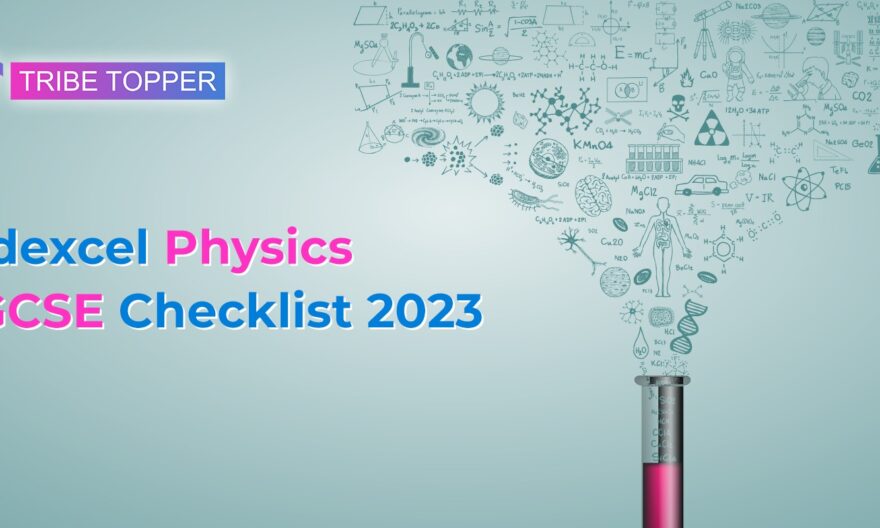
Edexcel Physics IGCSE is a curriculum developed by Edexcel, a subsidiary of Person Education. It is
designed to provide students with a comprehensive understanding of the fundamental principles of the
IGCSE level. The internationally recognized qualifications are widely accepted by universities and
employers worldwide. The Edexcel IGCSE Physics Exam syllabus covers many topics, including
mechanics, electricity, magnetism, waves, light, atoms, and nuclear physics. The course aims to develop
student’s scientific knowledge and skills, as well as problem-solving and investigative abilities.
JOIN US FOR MORE ON:
or
or Follow us on WhatsApp Channel
One of the key areas covered in the syllabus is mechanics, which deals with the study of forces, motion,
electricity, waves, and more. Students will learn about concepts like Newton’s laws of motion,
momentum, energy, and circular motion principles. They can explore the behavior of objects under
different forces, including gravity and friction. Electricity and magnetism are also the most important
topics of the IGCSE physics curriculum.
If you are wondering why you should consider taking Edexcel Physics IGCSE? Here’re some reasons –
- Extensive Knowledge – This course comprehensively explains fundamental physics principles,
including mechanics, electricity, magnetism, waves, light, atoms, and nuclear physics. - Internationally recognized Qualification – Edexcel Physics IGCSE is widely recognized and
accepted by universities and employers worldwide. - Strong Foundation for Further Study – The IGCSE syllabus lays a solid foundation for students
pursuing advanced studies in physics or related disciplines. - Practical skill development – The course emphasizes practical skill development through
laboratory experiments and investigations. - Problem-solving and Critical Thinking – The course nurtures problem-solving and critical
thinking skills. Students are presented with real-world scenarios and challenges that require
them to implement their knowledge.
Checklist 2023 for Edexcel Physics IGCSE:
Forces and Motion: The topic includes –
- Units (kilogram, meter/second, newton, second, and newton kilogram)
- Movement and Position (calculating time, distance, velocity-time graphs, etc.)
- Forces, Movement, Shape, and Momentum (change in speed, shape, direction, types of forces,
vector quantity, friction, mass, acceleration, etc.)
Electricity: The topic includes –
- Units (ampere, coulomb, joule, ohm, second, volt, and watt)
- Mains electricity (understanding the use of insulation, double insulation, earthing, the relation
between power, current, and voltage, etc.) - Energy and voltage in circuits (explain the series or parallel circuits, the voltage in wires, LDRs,
LEDs, etc.) - Electricity charge (common materials like electrical conductors or insulators, how insulating
materials are used, etc.)
Waves: The topic includes –
- Units (degree, hertz, meter, meter/second, and second)
- Properties of waves (difference between longitudinal, transverse waves, amplitude, wavefront,
frequency, wavelength, transferring matter, speed, frequency, etc.) - The Electromagnetic Spectrum (know the light, ultraviolet, x-ray and gamma-ray radiation,
radio, microwave) - Light and sound (use the law of reflection, refraction of light, longitudinal waves, sound in air,
etc.)
Energy Resources and Energy Transfers: The topic includes –
- Units (kilogram, joule, meter, meter/second, meter/second2, newton, second and watt)
- Energy transfers (describe energy transfers, the principle of energy conservation, the relation
between efficiency, absorption radiation, etc.) - Work and power (relation between work done, force, distance, energy transformed,
gravitational energy, mass, kinetic energy, etc.) - Energy resources and electricity generation (describe the energy transfers using wind, water,
geothermal resources, solar heating systems, solar cells, fossil fuels, nuclear power, etc.)
Solids, liquids, and gases: The topic includes –
- Units (degree Celsius, Kelvin, joule, kilogram, kilogram/metre3, meter, metre2, metre3,
meter/second, meter/second2, Newton, etc.) - Density and pressure (know and use the relationship between density, mass, volume, pressure,
force, area, etc.) - Change of state (why heating a system will change the energy, describe the changes that occur
when a solid melts, motion of particles in solids, liquids, and gasses, etc.) - Ideal gas molecules (exert a force, Kelvin scale of temperature, the relation between pressure
and volume, etc.)
Magnetism and electromagnetism: The topic includes –
- Units (ampere, volts, and watt)
- Magnetism (know that magnet repels, properties of magnetically, magnetic field line, etc.)
- Electromagnetism (electric current in a conductor, construction of electromagnets, circular coil,
etc.) - Electromagnetic induction (know that a voltage, electricity by the rotation, relation between
input and output, know and use the relation between input and output power, etc.)
Radioactivity and particles: The topic includes –
- Units (becquerel, centimeter, hour, minute, and second)
- Radioactivity (atom in terms of protons, neutrons, electrons, mass, number and isotype,
gamma, alpha, beta, particles, radioactivity, the difference between contamination and
irradiation, etc.) - Fission and Fusion (nucleus, radioactive daughter nuclei and neutrons, control rods and
moderators, etc.)
Astrophysics: The topic includes –
- Units (kilogram, meter, meter/second, meter/second2, newton, second, newton/kilogram)
- Motion in the universe (know about the universe, billions of stars, Milky Way galaxy, the relation
between orbital radius and period, etc.) - Stellar evolution (understand the stars, evolution of stars, evolution of stars, etc.)
- Cosmology (evolution of the universe, big bang theory, wave source, change in wavelength,
reference wavelength, galaxies, etc.)
Students can develop critical thinking and problem-solving abilities with the best Online Sample Papers
of IGCSE Physics. Students are presented with the most selective questionnaires having the possibility to
appear in exam papers. These provide a solid foundation in Physics and prepare the student for further
study. Sample papers, key concepts, mock papers, and more online exam preparation resources will
develop the knowledge and necessary skills to pursue careers in the fields such as engineering,
medicine, research, and many others.
